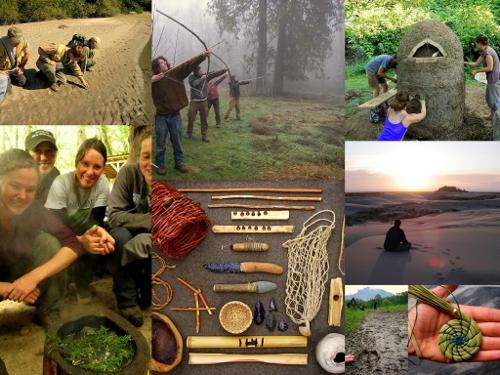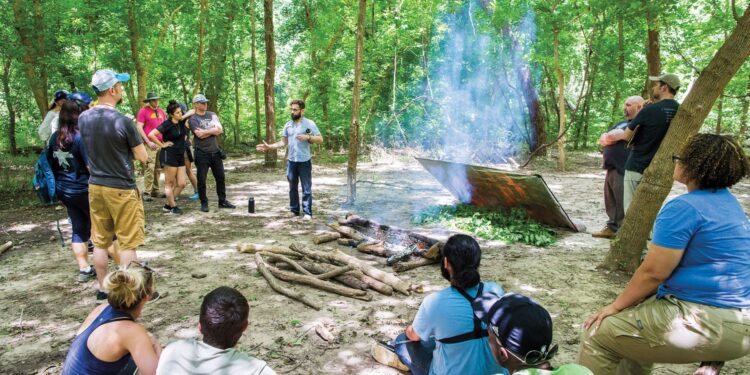This article is about outdoor survival and survival training courses, providing information on why such courses are important, what they cover, and where they can be found.
Outdoor survival can be a challenging and dangerous experience, and it is important for individuals to have the knowledge and skills necessary to stay alive in the wilderness.
While some survival skills can be learned through self-study or experience, others may require formal training. This article will provide an overview of outdoor survival and survival training courses, including what they cover, why they are important, and where they can be found.
The importance of outdoor survival skills

In any outdoor situation, there is always the potential for danger or the unexpected. By having a basic understanding of survival skills, individuals can be better prepared to handle these situations and increase their chances of survival. Survival skills can include knowledge of first aid, navigation, shelter-building, fire-starting, and food and water procurement.
The basics of outdoor survival courses
Outdoor survival courses are designed to teach individuals the skills necessary to survive in the wilderness. These courses can vary in length and content, but they generally cover topics such as shelter-building, water and food procurement, navigation, first aid, and emergency signaling. Some courses may also cover more specialized topics, such as wilderness medicine or animal encounters.
Types of outdoor survival courses
There are many types of outdoor survival courses available, ranging from short weekend courses to more intensive multi-week programs. Some courses are designed for beginners, while others are more advanced and may require previous experience. Courses can be found through a variety of organizations, including outdoor schools, community colleges, and private companies.
Choosing the right outdoor survival course
When choosing an outdoor survival course, it is important to consider one’s skill level and experience, as well as the content and length of the course. It is also important to research the instructors and their qualifications, as well as the safety record of the organization offering the course.
The benefits of outdoor survival courses
Outdoor survival courses can provide individuals with the knowledge and skills necessary to stay alive in the wilderness. They can also help build confidence and provide a sense of empowerment, as well as an appreciation for the natural world. In addition, completing a survival course can be a valuable addition to one’s resume and can be useful for those pursuing careers in outdoor recreation or emergency services.
Wilderness first aid courses
In addition to outdoor survival courses, wilderness first aid courses can be valuable for those who spend time in remote areas. These courses teach participants how to recognize and treat common wilderness injuries, such as fractures, sprains, and hypothermia. Wilderness first aid courses are offered through a variety of organizations, including the American Red Cross and the National Outdoor Leadership School.
Military survival training
Military survival training can be an intensive and rigorous form of survival training. It is designed to prepare individuals for extreme and life-threatening situations, such as being lost behind enemy lines or being shot down in enemy territory. Military survival training can be found through military branches or through private companies that specialize in military training.
Survival training for specific environments
Survival training can also be tailored to specific environments, such as desert, jungle, or arctic environments. These courses teach participants the unique skills necessary to survive in these harsh environments, such as how to find water in a desert or how to build a snow shelter in the arctic.
Virtual and online survival courses
For those unable to attend in-person survival courses, virtual and online survival courses can be a valuable alternative. These courses can cover many of the same topics as in-person courses, including shelter-building, fire-starting, and water procurement. They may also include virtual simulations or interactive activities to help participants practice their skills.
Certifications and accreditation
Some outdoor survival and wilderness first aid courses may offer certifications or accreditation upon completion. These can be useful for individuals pursuing careers in outdoor recreation or emergency services, as well as for personal satisfaction and confidence.

Certifications and accreditation can vary depending on the organization offering the course, so it is important to research and understand the value of any certification or accreditation.
Conclusion
Outdoor survival can be a challenging and rewarding experience, but it is important to have the knowledge and skills necessary to stay safe and alive in the wilderness. Survival training courses can provide individuals with the tools and confidence necessary to handle unexpected situations in the great outdoors.
From basic wilderness first aid courses to intensive military survival training, there are a variety of courses available to fit individual needs and skill levels. By researching and choosing the right course, individuals can gain the skills and confidence necessary to thrive in any outdoor environment.




